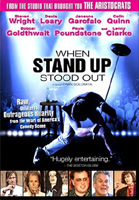 BUY IT AT AMAZON: CLICK HERE!
BUY IT AT AMAZON: CLICK HERE!
STUDIO: ThinkFilm
MSRP: $29.99
RATED: R
RUNNING TIME: 87 Minutes
SPECIAL FEATURES:
• Flashback w/ Dane Cook
• Concert sequences from featured comics
• Making-of featurette
• "Meany on the Street" archival footage
The Pitch
"A
world of comics linked by a single town, kinda like The Aristocrats, but with
The Humans
Steven
Wright, Kenny Rogerson, Bobcat Goldthwait, Denis Leary, Lenny Clarke, Tony V,
Paula Poundstone, and many more.
The Nutshell
Director
and narrator Fran Solomita takes the audience through the rise and plateau of
Boston stand-up comedy, from its explosive origins in the 70s, when there were
nearly as many as four comedy clubs to a street corner in the cities of Boston
and Cambridge, through the 80s, when success started to bust up the boys’ club
camaraderie of the prevailing comics, and concluding with the reunion of many
of those comics on one stage for a benefit for one of their own.

CHUD’s favorite gap-toothed mofo.
The Lowdown
Fran
Solomita is a good narrator for this film. He’s very sure about its purpose,
being the director as well, and he’s got the cred to back himself up, having
himself been a comedy club fixture in
is focused on. He’s got a light humor to his narration, self-effacing and only
a little scripted, which doesn’t get in the way of the comic geniuses that
dominate the film.
A stroke
of serendipity provided a marvelous running theme to this documentary, as comic
and former
the need for cash to support a sudden, undisclosed medical expense. Many of the
comics we know and love so well got their opportunities at Crimmins’ club, the
Ding Ho. Ding Ho alums from the nation over return at the end of the film to
offer tribute to their friend, and to raise money by way of a rapid fire
concert featuring people like Steven Right, Kenny Rogerson, and others.
The drama
that laces the preceding sections of the film gains a special weight because
the audience already knows where it’s building toward. It’s a narrative trick
that works awfully well in this piece of non-fiction.

Laugh and the world laughs with you;
play it straight and the world cancels your television show.
I’m not
really lying when I say that there is "drama" present, just in case
you were hoping for a comedy documentary with the humor level of, say, The
Aristocrats. When Stand Up Stood Out is a
recollection of the good times and the bad in the business of comedy, but is
mostly about the business, and not
the shows themselves. You get snippets of great routines, but in service of
underscoring an historic moment or point that Solomita wants you to get.
The
progression of
beginning to end, possibly because it has so many bright lights to focus on.
Rising head and shoulders above the other comics on display are Lenny Clarke
and Steven Wright, two brilliant comics with two vastly different modes of
conversation and comedy. Between the two of them, they account for the most
poignant moments in the film, recalling the way that
fraternity of talented, working stiffs, which slowly dissolved as injections of
success inspired bitterness amongst those comics who were not elevated to
primetime.
The
progression from camaraderie to competition is a familiar one, if you’re at all
interested in rock music biography, but it’s presence in this particular facet
of show business is fascinating, if only for the parallels that you can draw
between divas and professional doofuses.
Toward
the end of the film, Solomita ought to have shut up a bit. He tacks on a few
unnecessary observations that ruin the mood of the final shots, much like a bit
actor elbowing himself to the front during a curtain call, but the overall
effectiveness of the film still stands. It’s a frank, funny, and grungy look at
the business and history of comedy. When Stand Up Stood Out engages the
audience, and has only a little bit of trouble getting the crowd worked up.
Unless
you’re Irish.

This must be how the world looks through Steven Wright’s eyes.
The Package
For
bonuses, we’ve got Dane Cook, a comedian who didn’t appear during the film,
doing a flashback sequence of his own memories of the comedy sensation. Cook is
a funny man, but comes across as somewhat uncomfortable in this segment.
There’s also a few cut bits from the charity concert that leave you wanting
more and settling for less.
There’s a
behind-the-scenes, Solomita-heavy featurette, and a bit of archival footage
from Dave Meaney’s "Meaney on the Street" acts he used to perform on
the streets of
interest, except that Meaney’s segment reinforces how unfunny Tom Green is/was.
7 out of 10